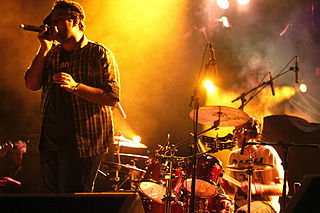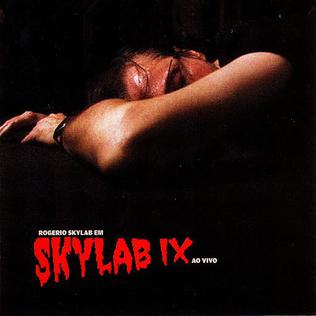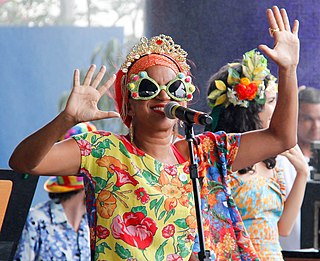
Samba is a name or prefix used for several rhythmic variants, such as samba urbano carioca, samba de roda, amongst many other forms of samba, mostly originated in the Rio de Janeiro and Bahia states. Samba is a broad term for many of the rhythms that compose the better known Brazilian music genres that originated in the Afro-Brazilian communities of Bahia in the late 19th century and early 20th century, having continued its development on the communities of Rio de Janeiro in the early 20th century. Having its roots in the Afro-Brazilian Candomblé, as well as other Afro-Brazilian and Indigenous folk traditions, such as the traditional Samba de Caboclo, it is considered one of the most important cultural phenomena in Brazil and one of the country's symbols. Present in the Portuguese language at least since the 19th century, the word "samba" was originally used to designate a "popular dance". Over time, its meaning has been extended to a "batuque-like circle dance", a dance style, and also to a "music genre". This process of establishing itself as a musical genre began in the 1910s and it had its inaugural landmark in the song "Pelo Telefone", launched in 1917. Despite being identified by its creators, the public, and the Brazilian music industry as "samba", this pioneering style was much more connected from the rhythmic and instrumental point of view to maxixe than to samba itself.
Brazilian rock refers to rock music produced in Brazil and usually sung in Portuguese. In the 1960s, it was known as iê-iê-iê, the Portuguese transcription of the line "Yeah, yeah, yeah" from the Beatles song "She Loves You".

Charlie Brown Jr. was a Brazilian rock band from Santos, São Paulo. The group was popular with disadvantaged youth because of their relatable commentary about social issues and the frequent use of skate punk and hip hop slang in their songs. The band won two Latin Grammy Awards and was one of the most-popular Brazilian bands of the late 1990s to mid-2000s.

Marcelo Maldonado Peixoto, also known as Marcelo D2, is a Brazilian rapper and songwriter, co-founder of Planet Hemp.
Orquestra Imperial is a Brazilian Big Band formed in 2002 with the objective of recreating the typical Gafieira Samba sound. The group brought together notable names from the new Carioca pop scene such as Rodrigo Amarante, Moreno Veloso, Domenico Lancellotti and Kassin, Nina Becker, Thalma de Freitas, Max Sette and Rubinho Jacobina with experienced musicians like Nélson Jacobina and the samba percussionist and singer Wilson das Neves. Other musicians who have contributed to the Orquestra include Berna Ceppas, Rodrigo Bartolo, Pedro Sá, Bidu Cordeiro and DJ Marlboro who has gained the title of official Orquestra Imperial DJ.

Marcelo de Souza Camelo is a Brazilian composer, singer, guitarist, and poet. He is best known as composer and lead guitarist of the Brazilian band Los Hermanos. Since the end of the band, he continues composing for many interpreters, mainly Maria Rita and Ivete Sangalo. In 2008, his first solo CD, "Sou", was released.

YB Music is an independent record label established in São Paulo, Brazil. It started in 1999, releasing music from new underground artists as well as revival acts. Its catalog includes different syles of Brazilian music featuring hip hop, samba-rock revisited by, electronic music, instrumental music including classical music and jazz, , and mangue beat from Recife. The label was responsible for the first album by Nação Zumbi after the death of their frontman Chico Science. The label received in 2001, 2005 and 2012 the APCA prize with the releases of Samba Rock, Samba Power and Badi Assad respectively.
Premiere is a Brazilian television channel on pay-per-view broadcasts the main football State Championships in Brazil, and the Brazilian Championship Série A and Série B. Being part of Canais Globo, it is present in SKY, Claro TV and Vivo TV, and some operators outside the country, such as MEO and NOS. From 1997 to 2006 it was called Premiere Esportes, switching to Premiere Futebol Clube and then to PFC, but in 2011 moved again, this time to Premiere FC, and finally to Premiere starting in 2013.

Skylab IX is a live album by the Brazilian musician Rogério Skylab, the ninth in his series of ten eponymous, numbered albums and his second live album overall following Skylab II from 2000. It was self-released on September 2, 2009 and recorded in September the previous year during a gig at the Centro Cultural São Paulo. The album includes guest appearances by Löis Lancaster of Zumbi do Mato, Maurício Pereira of Os Mulheres Negras and Marcelo Birck of Graforreia Xilarmônica. A live DVD of the performance, the first in Skylab's career, was simultaneously released; it contains more tracks than the CD version.

Melancolia e Carnaval is the eleventh studio album by the Brazilian musician Rogério Skylab; the second installment of what he calls the "Trilogia dos Carnavais". It was self-released in 2014, and counts with guest appearances by musicians Romulo Fróes and Jards Macalé, and by the Estação Primeira de Mangueira samba school.

The Brazil men's national under-19 volleyball team represents Brazil in international men's volleyball competitions and friendly matches under the age 19 and it is ruled by the Brazilian Volleyball Federation that is a member of South American volleyball body Confederación Sudamericana de Voleibol (CSV) and the international volleyball body government the Fédération Internationale de Volleyball (FIVB).

The Constituent Cortes of 1820, formal title The General and Extraordinary Cortes of the Portuguese Nation, also frequently known as the Sovereign Congress or the Cortes Constituintes Vintistas, was the first modern Portuguese parliament. Created after the Liberal Revolution of 1820 to prepare a constitution for Portugal and its overseas territories, it used a different system from the traditional General Cortes for choosing representatives, and the three traditional feudal estates no longer sat separately. The Cortes sat between January 24, 1821 and November 4, 1822 at the Necessidades Palace in Lisbon. The work of the Constitutional Cortes culminated in the approval of the Portuguese Constitution of 1822.

A mulher do fim do mundo is a studio album released by Brazilian singer Elza Soares in 2015. Soares, who was 85 when the album was released, recorded the album with the help of nearly three dozen producers, composers, songwriters and musicians including Victor Rice and figures from the vanguarda paulista scene. The album combines her usual style of samba with influences from jazz, afro-funk, noise rock and post-punk.

Preço Curto... Prazo Longo is the second album by Brazilian rock band Charlie Brown Jr. Like its predecessor, it was released through Virgin Records on March 6, 1999, and produced by Rick Bonadio and Tadeu Patolla. Totaling 25 tracks, it is Charlie Brown Jr.'s longest studio album; in an interview, vocalist Chorão explained that Preço Curto... Prazo Longo was recorded out of necessity, so the band could have more repertoire for the set list of their shows. Six of the album's tracks had previously appeared as teasers in the promotional EP Aquele Luxo!, released some months prior.

Nadando com os Tubarões is the third album by Brazilian alternative rock band Charlie Brown Jr., released in November 2000 through Virgin Records. It was the band's final album with original guitarist Thiago Castanho, who left the following year citing his dissatisfaction with their extensive touring schedule; however, he would return in 2005.
Marco Antônio Valentim Britto Júnior, known professionally as Marcão Britto or simply as Marcão, is a Brazilian singer-songwriter, lyricist, guitarist, record producer and YouTuber best known for his work with bands Charlie Brown Jr., TH6, A Banca and Bula.

Metá Metá is a Brazilian jazz band from São Paulo created in 2008 and formed by the trio Juçara Marçal (vocals), Kiko Dinucci (guitar) and Thiago França (saxophone).

Juçara Marçal Nunes is a Brazilian singer and teacher, known by her work on the bands Vésper Vocal, A Barca and Metá Metá, as well as by her solo career.














